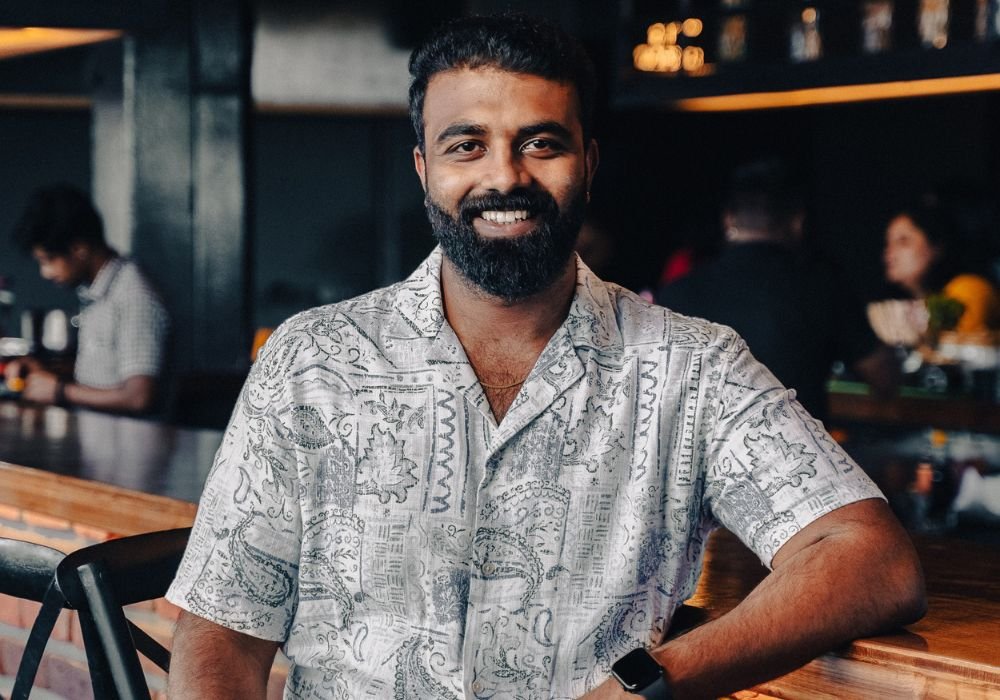Small-Batch, Big Impact: Wallop Brewing’s Journey to Revolutionize Indian Beer Culture
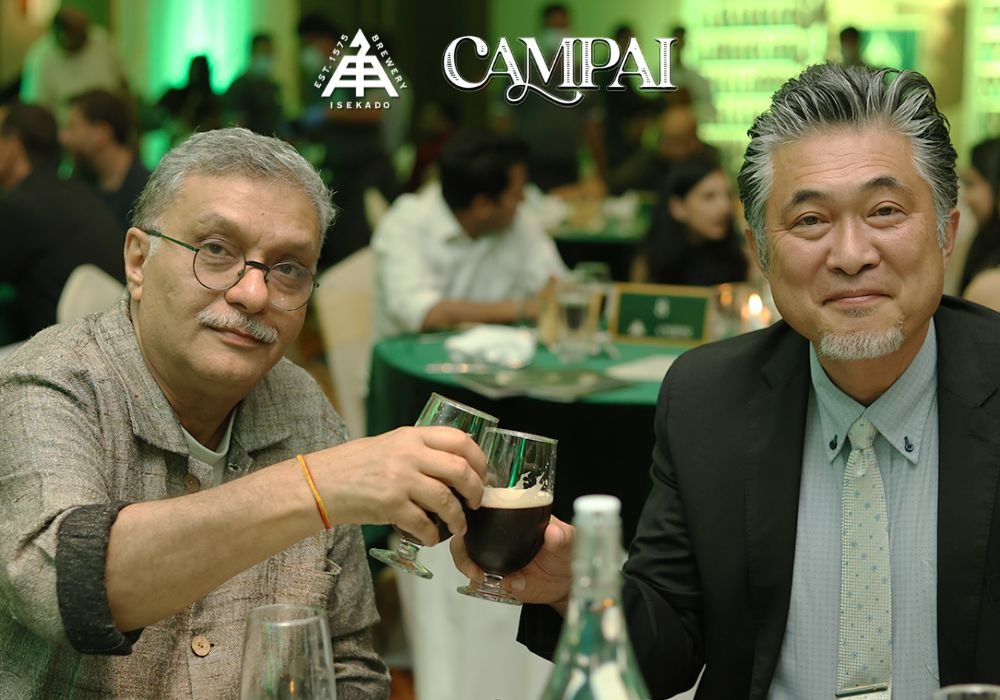
Wallop Brewing Company, a visionary family-owned and operated establishment, is spearheading a craft beer revolution from Banaras, India. Their mission is to introduce exceptional small-batch craft beers to the world, all while inviting beer enthusiasts to embark on a brewing journey of their own. At the heart of this endeavour is a unique concept—a space where individuals can create and craft their beer recipes, with the added benefit of professional packaging in bottles and kegs. Wallop is not merely a brewery; it’s a movement that aspires to redefine the beer-drinking culture in India and position Indian brews on the global stage. In its pursuit of this lofty goal, Wallop is actively fostering a vibrant community of dreamers, innovators, and idea enthusiasts to be part of their founding team, and together, they are set to share the infectious energy of Wallop with the world.
In a dynamic conversation with Brewer World, Vedant Chopra, the Chief Vibing Officer of Wallop Brewing Company, delves into the intriguing backstory of launching their brewery, the exhilarating journey of making their mark in India’s brewing landscape, and the exciting synergy they’ve forged with the renowned Ise Kado Brewery. Furthermore, Vedant sheds light on the grand vision and the intriguing long-term prospects of this Indo-Japanese partnership.

What made you start a brewery with essentially no experience in the industry?
Growing up in Banaras all my life, getting some exposure from my travels and studying in the States, I realized how little really penetrates small towns like ours and is almost always ignored because these second and third-tier city residents may be shrugged off as people who will not understand or consume it easily. And they may be right but it definitely should not mean that they are ignored and no exposure is given to them.
They just assume people will not like it – well, of course, they will not because they have never tried it – they don’t know what they are missing out on.
I was tired of getting generic mass-produced beer in the markets in my city, so I started brewing beer at home in 2020 with random equipment and jugaad. I was always a firm believer that – someone will eventually come and do what I want and take that opportunity – why can we not be that someone? I prepared a 60-page business plan for my family amidst COVID-19 along with some business plans for other industries but this was close to my passion and they saw that. Educating the market and exposing them to new brews was at the heart of the plan.
Wallop was birthed with this belief and another very important core belief of coexistence, not competition. We wanted to only focus on small-batch brews. Through our brewery visits and research, we saw everyone focused on large-scale production and speedy fermentation to focus on turnover and ignore the quality, especially in the North.
We founded Wallop to foster small batch crafted brews with the closest precision as possible. With time, our vision was supported by influential people in the industry, which only reassured us and grew our vision to newer and more diverse avenues.
It all began with some basic research about the excise laws, equipment, process, market and how to sell and before we even realised fully – we were seen as people who are doing the business while in our heads – this was all a part of feasibility studies. Today we are glad we took the plunge and we get to meet like minded people who want to self associate and advance this vision.
Now, Wallop runs with the supervision and guidance of my father, Mr Vineet Chopra along with the rest of my family of two sisters and mother who all have different hats and vital roles to play in the business. We sit down for dinner EVERY DAY unwinding our business talks as they have some of their own independent ventures, and also about life. We want to retain this family value and make people believe in our potential as a family unit.
The new family of Wallop also has a huge role to play – from our Canadian Brewmaster, Martin Bernard to our team from all over the country who have moved miles away from their homes to support the vision and advance it.
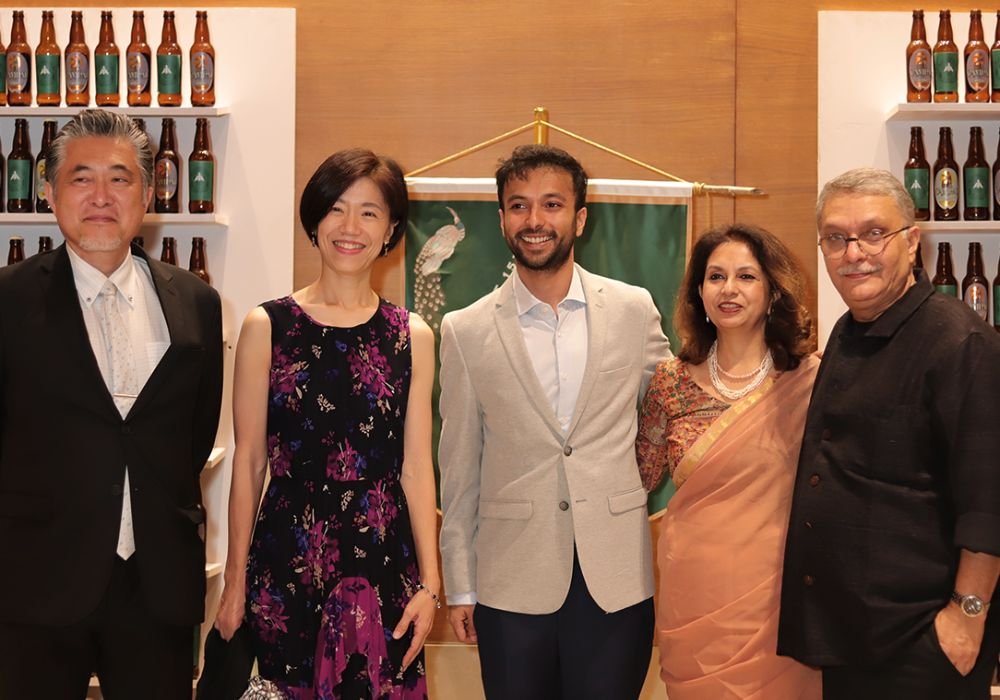
How did the collaboration between the Wallop Brewing Company and Ise Kado Brewery come about, and what made you decide to work together?
Our family has been working with the Japanese for around 30 years in the fashion industry, and we have been fascinated by their work culture and ethics ever since. We have grown up with their culture fused with ours, as we would have some Japanese buyers living at home every month.
When we came up with the plan to open a brewery, my father instantly turned to his contacts in Japan, so I could undergo training and master the quality the way the Japanese do. We were introduced to the Ise Kado team in 2020 with the agenda for them to consult us to establish our brewery and give me the right training in their facilities. Because of the pandemic, travel became impossible, and we decided to establish it on our own with other industry experts from the south of India.
A few years later, Ise Kado reached out to us, asking about our progress and their wish to expand to India. We then formulated a plan to change the landscape of how beer is viewed and consumed in the North of India first and then spread our vision across together.
They visited our brewery before locking in anything and on the very trip expressed that they would like to partner with us for the shared vision we have and because our values aligned like no other partners they are working with across different countries. Moreover, our quality consciousness and attention to detail won them over. They even said that some things were not practised by them but are implemented by us, and that was very impressive to them.
For my father, it was a dream to work with the Japanese in this industry too, because he is in awe of the work ethics of the Japanese. Ise Kado’s history and legacy spoke to us, and Mr Narihiro Suzuki’s story of starting a brewery in Japan on his own and his struggles won us over to do business with them.
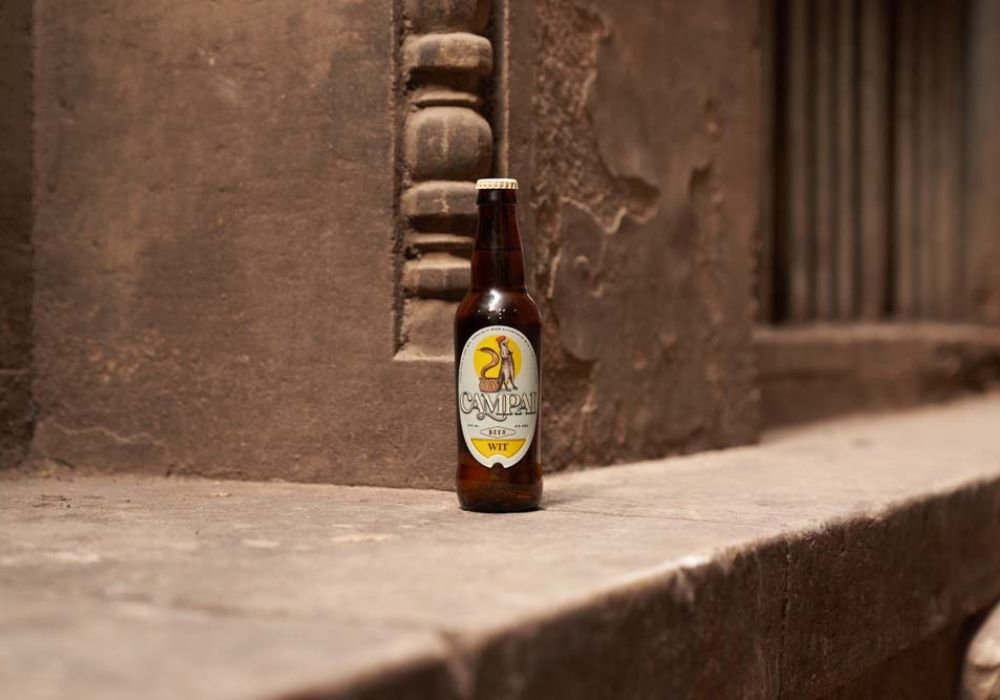
Tell us about the beer. In what ways have you planned to integrate elements of both Indian and Japanese cultures into the beer and its branding?
The plan is to co-exist and to try to change the consumption style of Indians and expose them to variants they never knew existed. I don’t fully know what the limitations of beer profiles we can introduce are, which is why we have a pilot plant in our small brewery to play with palettes and test different styles of beers in the market.
For now, we want to respect the legacy of the 450-year-old Japanese company and introduce its beers as it is to the market. We will soon collaborate in the brews we do together, infusing our traditions to brew the best beer we can.
Our brand, Campai, got its inspiration from the Japanese word for cheers. Kanpai in Japanese is cheers, and Campai is our rendition of it. We don’t have a word for ‘Cheers’ in our culture, and because of the influence we already have of the Japanese, this was a biased decision for naming the brand, but we are very happy with it now.
Campai, however, is an Indian Beer brewed with Indian ingredients because the USP of the beer was to use everything best we can from India, and if needed, import the ones whose quality and extraction we cannot optimise.
More collaboration brews with our shared experiences and knowledge to come soon.
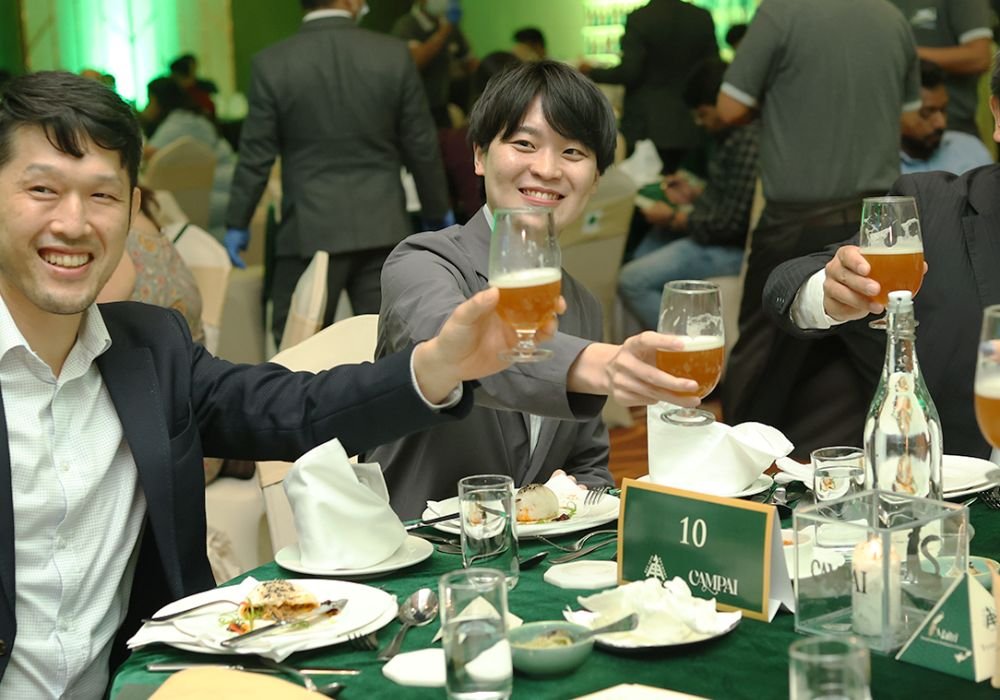
What are the unique characteristics of the beer that reflect the fusion of Indian and Japanese influences?
Right now, our beer has its own identity for the Indians. We tried to be as Indian as we could with this first brand we launched – taking as many local ingredients as we could to show the world the real potential of Indian beers, so we did not use imported malts and only used Indian Barley and Indian wheat from the farmers around the North. We surprised ourselves as well with how good the extraction came out.
With the Japanese beers, they want to get their traditional brews first and then do special brews together for the Indian market with our spices and flavours infused.
Tell us about the brewing process and any special ingredients used in the beer. How do they contribute to its distinct taste?
It is a small batch brew where spices are hand-blended and then pitched in the tank. Since we are just starting, we are infusing hops in regular beers that the market is used to, so people know the taste of hops. This beer acts as a gateway to the next brands and variants we introduce.
We even put scales on bottles like IBU, SRM and ABV in each variant only to educate our market and also so they know which scales of beer are they most comfortable with, eventually.
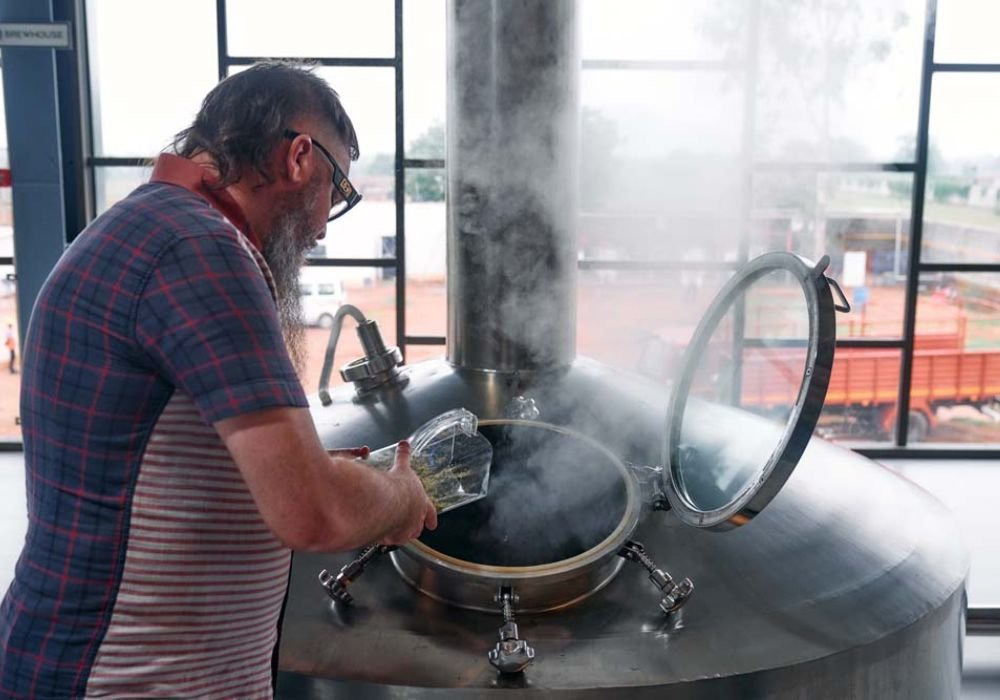
How do you envision beer appealing to consumers in India?
Campai is a beer that does not give you the hangover you expect from strong beers. Campai Strong is one of the strongest beers in the market, yet its smoothness and kick are different from the rest of the beers in its category – simply because we respect the time of fermentation and let it mature the way it is meant to be. Yes, our turnover from 1 tank is low, but our quality is what sets us apart. This method also contributes to low-caloric beers since we are not adding extra sugars to speed up fermentation.
For the Campai Wit, we have closely worked to ensure the mouthfeel of spices linger in the mouth longer and leave you wanting more.
Who is your target audience? Will the beer be available nationwide, or are you focusing on specific cities for the launch?
To start with, our beers will only be available in Uttar Pradesh, our home state and then move to other places in the north.
Wallop exists because we have no beers in Banaras, so I started brewing beer at home, which gave birth to the idea of introducing good beers to second-tier cities and exposing them to new variants. It is challenging to get this market to turn the way we want it to, but it is with a vision and plan that we have come up with to try to nudge them for quality brews.
Our idea is also to get Indian beers recognised on a global platform and to introduce more variants to the people who have been left out so far.
In what ways do you see this collaboration contributing to the craft beer industry in both India and Japan?
It is monumental – we are the first to manufacture anything Japanese brand – consumable goods, be it alcoholic or non-alcoholic beverages. Hopefully, with our collaboration and consciousness of quality, we can inspire others to do better too.
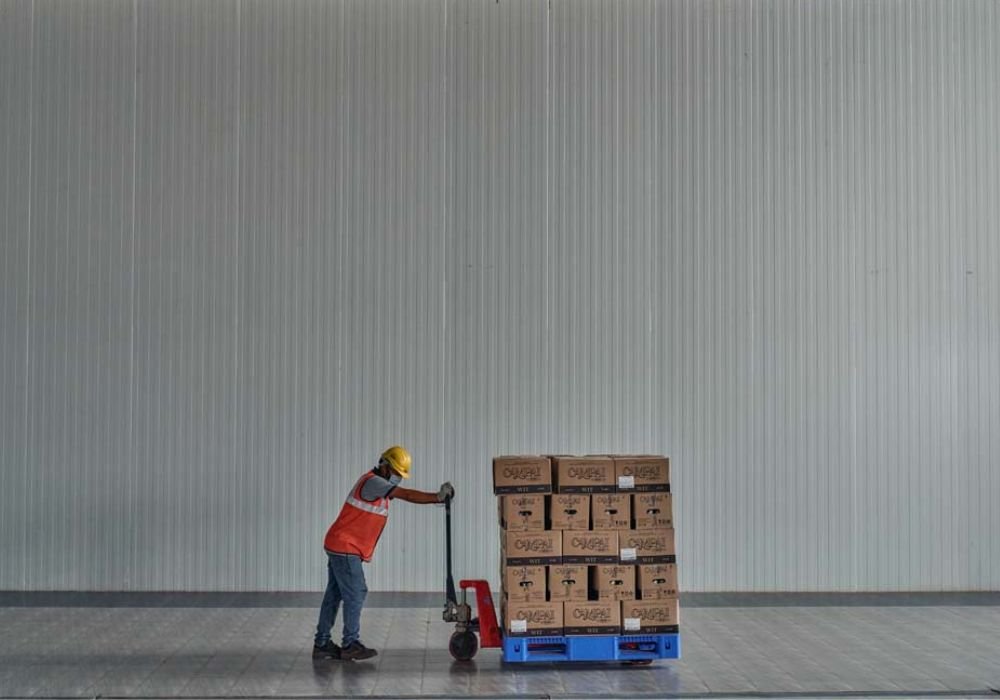
Do you have plans for limited editions or seasonal variations of the beer to keep the collaboration fresh and exciting?
Yes, of course, this is why we have a pilot plant that allows us to constantly experiment, improve and progress the styles for our market. However, the legal policies for excise discourage this by making every step of the way a paid activity and more paperwork, but we want to actively work with the government to change this.
How will you measure the success of the collaboration, and what are your long-term aspirations for the partnership?
We measure success when we see a shift in beer consumption from people who ‘drink to get drunk’ to people who want to drink for their lifestyle needs and prefer low-ABV drinks. Our long-term plan is to constantly and consistently alleviate the standards of our market.
How do you plan to celebrate and honour the Indo-Japanese partnership through your collaboration beyond the beer itself? Tell us about the launch event.
We portrayed beers in the light that could be paired with fine dining because of the misconception that beer bloats you and gases you up, but that is true for beers that have flash fermented their beers and sped up the yeast fermentation process.
The event focused on embracing the ‘bitterness’ contributed by Hops and expressing the versatility of these beers with everyday food and fine dine food too.
Is there anything else you’d like to share about your collaboration and the exciting journey you’re embarking on?
We came with a vision to co-exist, that was first seized by the Japanese. Wallop was established with the belief to give all the small-batch beer entrepreneurs a platform to brew their craft beers the way they intend to and not be forced to brew in larger mass-produced vessels that are available to them until now.
We want to encourage people to think about the quality more than anything else. We also want people to do tours and see beers in a different light that has not been seen before.
Banaras is a sleeping giant with a ton of opportunities under its belt, only waiting to be recognized in other aspects than just the religion bit. We want to explore all the avenues without moving away from the traditions but only advancing the legacy of Banaras while retaining our core values which have so often been drawn from the city.
We want Banaras and Banarasis to be proud of hosting the brewery and personally associate themselves with it.
Cheers!
Socialise and connect with them at: https://instagram.com/campai.in?igshid=MzRlODBiNWFlZA==

